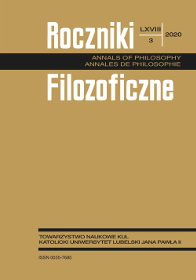Providence, Chance, Divine Causation, and Molinism: A Reply to Łukasiewicz
Abstract
Dariusz Łukasiewicz’s “Divine Providence and Chance in the World” attempts to show that the strong traditional understanding of providence is no longer tenable, especially for one who adopts the current scientific picture of the world. In its place, Łukasiewicz suggests, we need to adopt a view of providence which allows for genuine chance events not controlled by God. I argue that he has not made his case on the need for the traditional view to be abandoned. I then examine two directions a Christian might go so as to accommodate most of the attractive elements of Łukasiewicz’s revisionary account without succumbing to the philosophical and theological defects his position exhibits.
References
Flint, Thomas P. Divine Providence: The Molinist Account. Ithaca, NY: Cornell University Press, 1998.
Freddoso, Alfred J. “Introduction.” In On Divine Foreknowledge: Part IV of the Concordia, by Luis de Molina, 1–81.
Molina, Luis de. On Divine Foreknowledge: Part IV of the Concordia. Translated and edited by Alfred J. Freddoso. Ithaca, NY: Cornell University Press, 1988.
Perszyk, Ken, ed. Molinism: The Contemporary Debate. Oxford: Oxford University Press, 2011.
Plantinga, Alvin. “Response.” Philosophia Reformata 79, no. 1 (2014): 91.
Plantinga, Alvin. Where the Conflict Really Lies: Science, Religion, and Naturalism. New York: Oxford University Press, 2011.
Silva, Ignatio. “Great Minds Think (Almost) Alike: Thomas Aquinas and Alvin Plantinga on Divine Action in Nature.” Philosophia Reformata 79, no. 1 (2014): 8–20.
Copyright (c) 2020 Roczniki Filozoficzne

This work is licensed under a Creative Commons Attribution-NonCommercial-NoDerivatives 4.0 International License.





